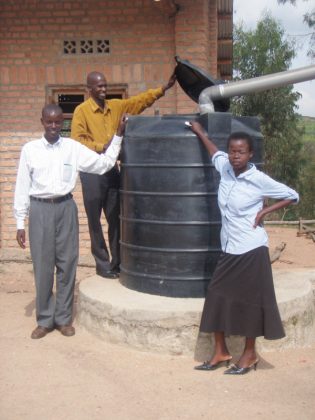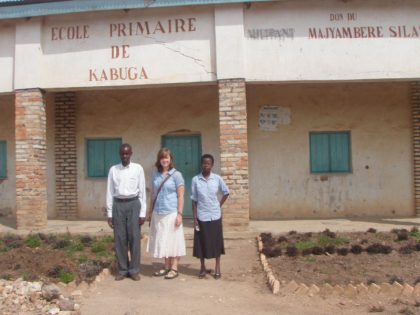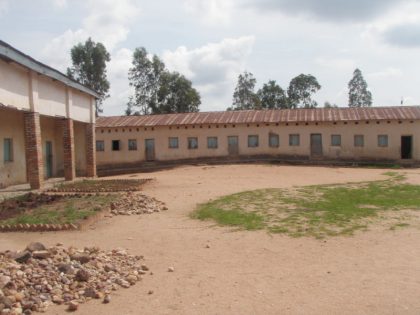Community Description
Bahunda is located about 3 hours outside of the Kigali capital. It is a poor rural area of Rwanda, with no electricity and limited access to water.
The Kabuga Primary School is over 50 years old. There are 14 classrooms that house 1,200 students, ranging in age from 6-16 years old, and 20 teachers.
Students travel up to 2 kilometers by foot every day for school. The current headmaster has been there for 16 years.
The community surrounding the school is all farmland. There is one small dirt road that leads up to the school. The school has some after-school clubs and sports including volleyball, soccer, traditional dance, a garden club, and anti-AIDS club. The soccer field is 1 kilometer away from the school.
 There is an existing rainwater catchment system, consisting of gutters and a 1,500-liter water tank. However, it is insufficient to meet the needs of the school.
There is an existing rainwater catchment system, consisting of gutters and a 1,500-liter water tank. However, it is insufficient to meet the needs of the school.
There is currently enough water to fill the tanks from March to the beginning of May. The school year in Rwanda goes from January until October. From May until September there is almost no rain. From October until February there is a little rain but not enough to keep the tanks filled.
The school needs water for drinking, cooking, cleaning the chalkboards, floors, and windows, and watering the gardens. The students must walk 300 meters down a steep hill to retrieve water and carry it back up the hill.
Project Description
This project is to build a rainwater catchment and storage system at the school.
A new guttering system will be installed on the classroom building. A new 2,000-liter tank will be purchased and placed on a platform, which will be about 2 feet high, and built out of concrete.
 The tank will be purchased in Kigali and delivered by truck. It is made of tough plastic, and is expected to last for over 20 years.
The tank will be purchased in Kigali and delivered by truck. It is made of tough plastic, and is expected to last for over 20 years.
With this second tank, enough water will be stored during the rainy season to last the school through the dry season.
Water will be purified by filtering and boiling in large pots. This water will also be offered to the community at large.
The school will hire local Rwandans to install the gutters, make the platform, and set up a water tank.
Project funds will primarily be used to buy the water tank. The rest of the funds will go toward material and labor costs.
All other costs, including for water treatment, will be paid by the school.
The Peace Corps Volunteer will help the school and surrounding community to understand water management, and demonstrate the water treatment process.
Project Impact
1,220 students and staff plus 4,600 members of the community will benefit from the project.
Peace Corps Volunteer Directing Project
Sonya Alexander
Comments
This is a tremendous project that will give needed water to the school, which currently does not have enough water for the daily needs of the students. In addition, the supply will be available to the community, resulting in a huge impact on the entire village.
The number one killer of children under 5 in Rwanda is diarrhea, mostly from drinking contaminated water. The project not only gives the people access to clean water, but educates them as to the dangers of drinking unsafe water and the benefits of drinking treated water. It will have a significant effect on the reduction of disease.
Dollar Amount of Project
$500.00
Donations Collected to Date
$500.00
Dollar Amount Needed
$0.00 – This project has now been fully funded through the generosity of The Soneva SLOW LIFE Trust as a part of their Clean Water Projects initiative.
We encourage others to continue to donate using the Donate button below, and we will notify Sonya of your donation. Additional funds will be used to fund the next project by the PCV and/or other projects in the country of service.
This project has been finished. To read about the conclusion of the project, CLICK HERE.
